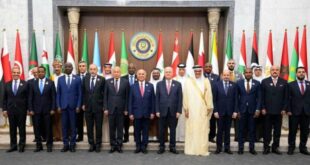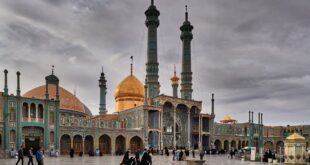BAGHDAD (AP) — A military investigation into allegations that American troops intentionally killed civilians in Ishaqi, a village north of Baghdad, has cleared them of misconduct, the US said — even though it acknowledged the deaths of up to 13 Iraqis in the March raid.
Meanwhile, a lawyer representing families of some of the two dozen unarmed Iraqi civilians allegedly killed by US Marines in the western town of Haditha on November 19 said Friday that three or four Marines carried out the shootings while 20 more waited outside the homes. He also said victims’ relatives turned down a request by US investigators to exhume the victims’ bodies for forensic tests.
The investigation of the March 15 attack in Ishaqi concluded that the US troops followed normal procedures in raising the level of force as they came under attack upon approaching a building where they believed an Al Qaeda terrorist was hiding, said Maj. Gen. William Caldwell, a US military spokesman.
Caldwell also acknowledged there were “possibly up to nine collateral deaths†in addition to the four Iraqi deaths that the military announced at the time of the raid.
The results of the investigation were released after questions were raised about the original US report as television stations aired AP Television News footage of a row of dead children in the aftermath of the raid.
The probe was part of US investigations into possible misconduct by American troops in at least three separate areas of Iraq. Besides Haditha and Ishaqi, seven Marines and a navy corpsman could face murder, kidnapping and conspiracy charges in the April shooting death of an Iraqi man west of Baghdad.
The military said Friday it will cooperate with the Iraqi government in its own investigation of Haditha and other incidents of alleged wrongdoing by US troops. “We’re going to give them whatever assistance they need as a part of this investigation,†said Army Brig. Gen. Donald Campbell, the chief of staff for US forces in Iraq.
Campbell’s pledge came a day after Prime Minister Nouri Maliki upbraided the US military over Haditha, which he called “a horrible crime,†and accused US troops of habitually attacking unarmed civilians.
On Friday, White House press secretary Tony Snow said Maliki had told US Ambassador Zalmay Khalilzad that he had been misquoted. But Snow was unable to explain what Maliki told Khalilzad or how he had been misquoted.
Defence Secretary Donald Rumsfeld defended the training and conduct of US troops and said incidents such as the alleged massacre of Iraqi civilians at Haditha shouldn’t happen.
“We know that 99.9 per cent of our forces conduct themselves in an exemplary manner. We also know that in conflicts things that shouldn’t happen, do happen,†he said. “We don’t expect US soldiers to act that way, and they’re trained not to.†In Haditha, the Marines, enraged by the loss of a comrade, stormed into nearby homes in the area and allegedly shot occupants dead as well as several men in a taxi that arrived at the scene of the blast, according to US lawmakers briefed by military officials.
In one of the homes, Marines ordered four brothers inside a closet and shot them dead, said the Haditha lawyer, Khaled Salem Rsayef.
Rsayef said he himself lost several relatives in the alleged massacre, including a sister and her husband, an aunt, an uncle and several cousins. He and his brother, Salam Salem Rsayef, spoke to the Associated Press by telephone from the Euphrates River town of 90,000 late Thursday and Friday.
Despite the Iraqi government’s insistence of cooperation between the US and Iraqi investigations, the Rsayefs said they and other victims’ families refused the request several months ago to exhume the bodies.
“No way we can ever agree to that,†Salam Salem Rsayef said. Under Islamic teachings, exhuming bodies is prohibited, but is allowed on case-by-case basis, sometime after a fatwa, or an edict, from a senior cleric allowing it to proceed.
The Rsayef brothers met at least four times with US military investigators looking into the killings. They said the meetings began in February and were held at Samarra General Hospital. The next meeting is scheduled for Sunday, the two brothers said, suggesting that the US investigations are not finished.
Khaled Salam Rsayef identified the four brothers killed in the closet as a car dealer, a traffic policeman, an engineer and a local government employee. He said the US military did not give compensation payments to their families because the brothers were believed to be insurgents.
The lawyer said his account of what happened was based on his personal observations from the rooftop of his home and windows. He said his house is several dozen yards away from the three homes raided by Marines. The killings, which he did not witness in person, were recounted to him and other members of his family the following day by survivors, he said.
He said his own home shook violently when the roadside bomb went off at 7:15am and that intermittent gunfire lasted for about two hours. He could not go out of his house to see for himself, but managed to steal quick glances from his roof and from behind windows.
“About 5:00pm. I emerged with my family carrying white flags,†he said. “We wanted to move away from the area fearing that shooting could resume.†The New York Times, in a story for Saturday editions posted on its website, quoted a senior Marine officer as saying that commanders learned within two days that civilians in Haditha were killed by gunfire and not a roadside bomb. But the officer, who wasn’t further identified, said officials had no information suggesting the civilians had been killed deliberately and saw no reason to investigate further.
The Haditha attack came four months before the nighttime raid in the village of Ishaqi, about 80 kilometres north of Baghdad.
A US ground force conducted the Ishaqi attack, said two defence officials in Washington. After being fired upon from the targeted building, the soldiers pulled back and called in air strikes by an Air Force AC-130 gunship, which attacked and collapsed the building, they said.
One of the officials said the investigation into the circumstances of the Ishaqi attack found that four people in the building were killed by US forces, including two women and a child. The main target of the attack, said by US intelligence to be an Al Qaeda figure, ran from the building but was later captured, the official said.
Caldwell said that a search found “the body of Abu Ahmed plus three noncombatants,†while the “investigating officer concluded that possibly up to nine collateral deaths resulted from this engagement but could not determine the precise number due to collapsed walls and heavy debris.†Local Iraqis said there were 11 dead, contending they were killed by US troops before the house was levelled.
The bloody aftermath of the attack was captured at the time in the footage shot by an AP Television News cameraman. The video became the focus of attention Friday when the BBC aired it in the wake of recent allegations of US troops killing unarmed civilians.
The footage shows at least one adult male and four of the children with deep wounds to the head that could have been caused by bullets or shrapnel.
 Eurasia Press & News
Eurasia Press & News



